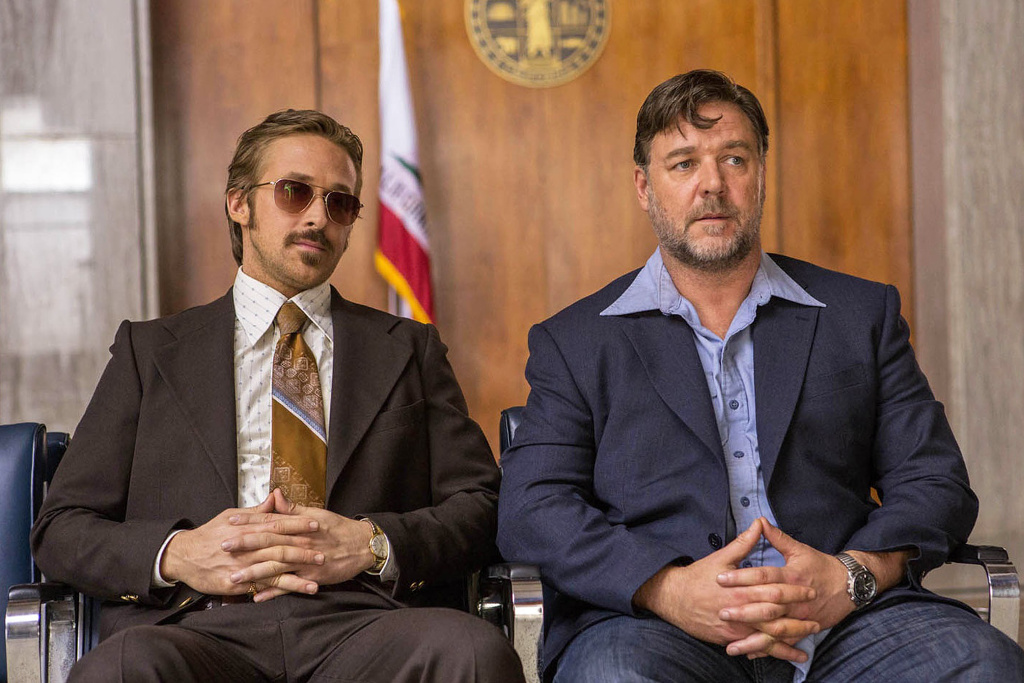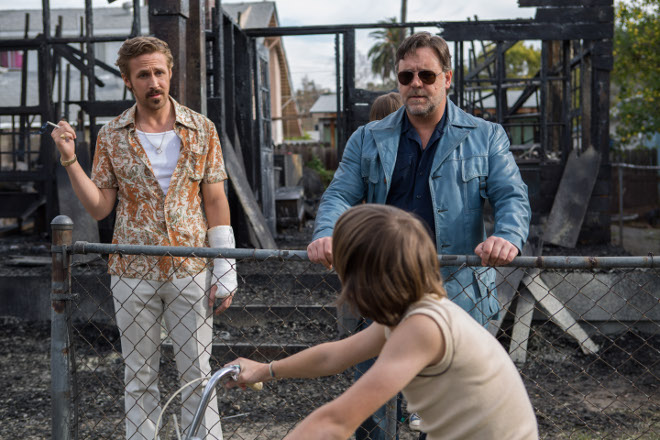Review: ‘The Nice Guys’ Is Exactly The Kind Of Smart Action Comedy You’ve Been Waiting For
Yep, Ryan Gosling and Russell Crowe are hilarious.

There’s an odd sort of nationalistic pride involved in having known for nearly two years that The Nice Guys was going to be great. Not because it stars Russell Crowe, our national (borrowed) treasure, but because back in January 2015, Crowe and co-star Ryan Gosling appeared via satellite at the fourth AACTA Awards, in costume on-set, and stole the show:
Well, when I say I “know” it was going to be great, I actually mean: I was “possibly hanging onto a fool’s hope”. How many other times have we been promised a hard-R buddy-noir set in 1970s Los Angeles starring two of cinema’s most charismatic leading men only to end up disappointed? (Don’t answer that).
Fortunately, Shane Black (Lethal Weapon, Last Action Hero, Kiss Kiss Bang Bang) — whose multi-million dollar screenplay sales made him the toast of the ‘90s, but whose most recent effort as co-writer/director, Iron Man 3, was stymied by the Marvel industrial complex — is just the guy to deliver a hard-R buddy-noir set in… you get the picture.
–
Yes, We’ve Heard This Story Before
The film kicks off with The Temptations’ ‘Papa Was A Rolling Stone’ as the camera swoops down over a smog-blanketed Los Angeles nightscape. We then jump into a groovy late-Modern house to spy a pre-teen boy’s nightly finagling of his father’s titty mag before being interrupted by a spectacular car crash featuring a topless female porn star. It seems clear precisely what The Nice Guys plans to offer the viewer.
But to take this mean-spirited prologue at face value would do a disservice to the rest of the film, which is one of the breeziest and most charming comedies in years. That it also revels in the violence and sexual politics (or lack thereof) of its ‘70s milieu, incredibly, doesn’t lessen the charm.
The Nice Guys concerns the life and work of Jackson Healy (Russell Crowe), a sensitive and principled thug, and Holland March (Ryan Gosling), a subpar private investigator and careworn single dad to precocious 13-year-old Holly (Angourie Rice).
March is busy tailing Amelia (Margaret Qualley), a young woman who looks enough like the missing niece of a nice old lady who hired him that he figures he can continue to take her money. When a frightened Amelia hires “Mr Healy” to rough up the various men who are following her, March is first on the list. After breaking March’s arm, and bonding with Holly on his way out, Healy soon discovers that the other guys tailing Amelia — two goons played with near-psychotic relish by Beau Knapp and Keith David — are much more alarming.
The pair team up, with the un-asked-for assistance of Holly, and begin to unravel the case, which they soon discover involves dodgy porn filmmakers, idealistic hippie protesters, a sexually aggressive teenager, the automobile industry, and top-ranking government officials. To explain much more would undo the noir-like twists and turns (many of them hamfisted, as the genre demands) that make The Nice Guys such a romp.
The film is also a love letter to Los Angeles — or rather the grubby heart of the city that still beats beyond the gentrified LA of shows like Love and Transparent, or the tidy, wealthy “west of the 405” setting of the films of James L. Brooks and Judd Apatow. The skyscapes are heavy with smog, and the film begins behind the Hollywood Sign, like an Ed Ruscha painting come to life. The smog, central to the film’s mystery, really was that bad. Ruscha, the storied chronicler of Los Angelean imagery, once said of the East Hollywood studio he occupied for two decades, “I would look out my window there, and if I could see the Hollywood sign I’d know the weather wasn’t too smoggy.”
–
The Ryan And Russell Show
For all its enjoyable period eccentricities and throwaway delights (look! It’s Earth, Wind & Fire!), The Nice Guys really sings because of the performances of its leads. Crowe, looking especially husky in a sky-blue leather jacket, is a sad-eyed charmer as Healy; while Gosling reveals hitherto untapped comedic brilliance as the alternately sulky and hysterical March.

It’s such fun watching the pair muddle their way through a labyrinth of bad vibes. Crowe’s Healy is only slightly more adept than Gosling’s March, and both spend a good portion of the film screaming, swearing or squealing. While the film revels in the occasional hamminess of hard-boiled noir, The Nice Guys owes more to Looney Tunes’ Chuck Jones than it does Billy Wilder; the action sequences are more slapstick than post-John Woo acrobatics.
We don’t know much about either of them, but it’s a testament to Black’s skill that what little information we are fed about the men’s backstories provides a breadcrumb trail that eventually pays off with considerable emotional heft. An off-hand joke sets up a heartbreaking reveal that is delivered with equal insouciance, as Black wisely keeps the duo from wallowing; instead, the new information injects the breakneck final act with much-needed pathos.
Rice is delightful as well, as March’s weary daughter. Her sparky sparring with Crowe recalls Margaret O’Brien’s Tootie from Meet Me In St Louis, and the pair share a delightful scene where they bond over Yoo-Hoo while Hollie assesses Healy’s character.
–
Why Don’t We See This More?
Before my session of The Nice Guys began, the audience was subjected to a number of “red band” trailers for upcoming comedies: there was the bloodless mayhem of Central Intelligence and the witless shock-comedy of Mike And Dave Need Wedding Dates. The audience remained unmoved by both (someone even blew a raspberry after Mike And Dave). Both films seemed to have been written by a committee of 14-year-old boys.
Action-comedy and buddy-comedy has inhabited an uneasy space for the past decade or so; playing with sex and violence to provide a frisson of naughtiness, but maintaining its PG-13 rating to usher as many audience “quadrants” as possible through the door. It’s like the weird kid on a bike in The Nice Guys who offers to show Healy and March his dick; these teen-friendly “red band” blockbusters deal in the idea of the abject but never fully commit.
The Nice Guys deftly dismantles these tired blockbuster comedy tropes. Its humour is blunt and profane, and finds its shock value in tableaux of degradation (this is perhaps not the film for an undergrad-feminist night out) rather than, as less skillful comedies do, simply describing outlandish sex acts or body parts while remaining terrified of intimacy.
Similarly, the violence is, well, violent. I’m sure Central Intelligence will feature The Rock breaking the necks of dozens of hapless redshirts without so much as a smear of blood. But, though the violence here may at times be funny, as Healy and March are battered and bruised, and their adversaries shot, stabbed and (on occasion) blown up, it doesn’t seem particularly fun. There are moments when people are dispatched with such callousness that you may recoil from the screen, but then perhaps that’s the point? This is a film in which violence — as hilarious as it often is — has consequences including a sudden real reassessment of someone’s character.
Perhaps Black has read his Zizek — “Violence is never just abstract violence. It’s a kind of brutal intervention in the real” — or perhaps he’s just keen to steal back the genre he helped create, and return it to an adult audience. Either way, The Nice Guys is the action comedy we all hoped we’d get when we grew up.
–
The Nice Guys is in cinemas now.
–
Clem Bastow is an award-winning writer and critic with a focus on popular culture, gender politics, mental health, and weird internet humour. She’s on Twitter at @clembastow.
